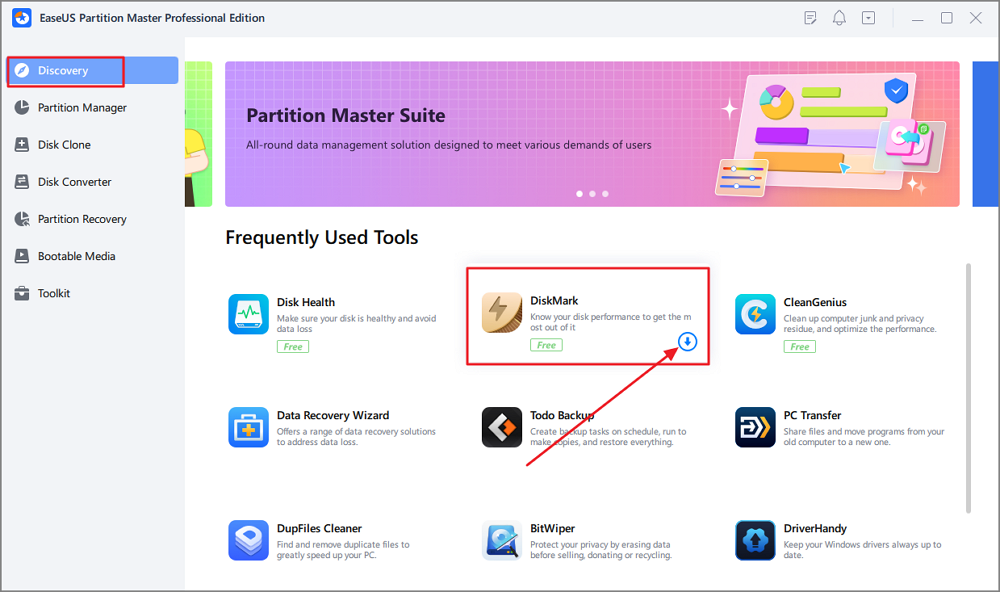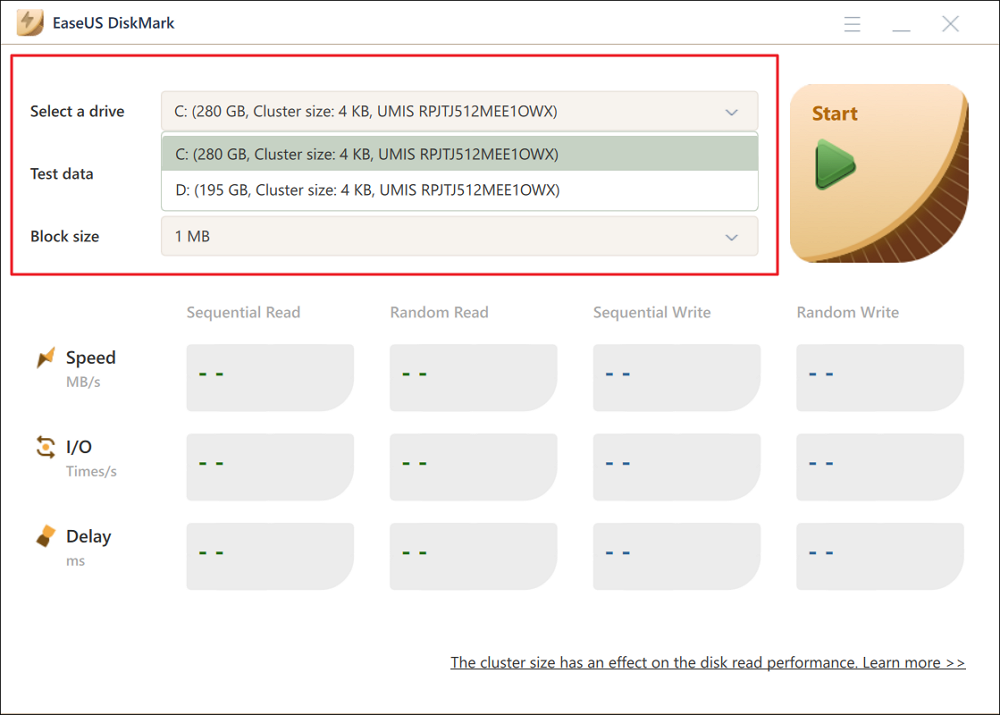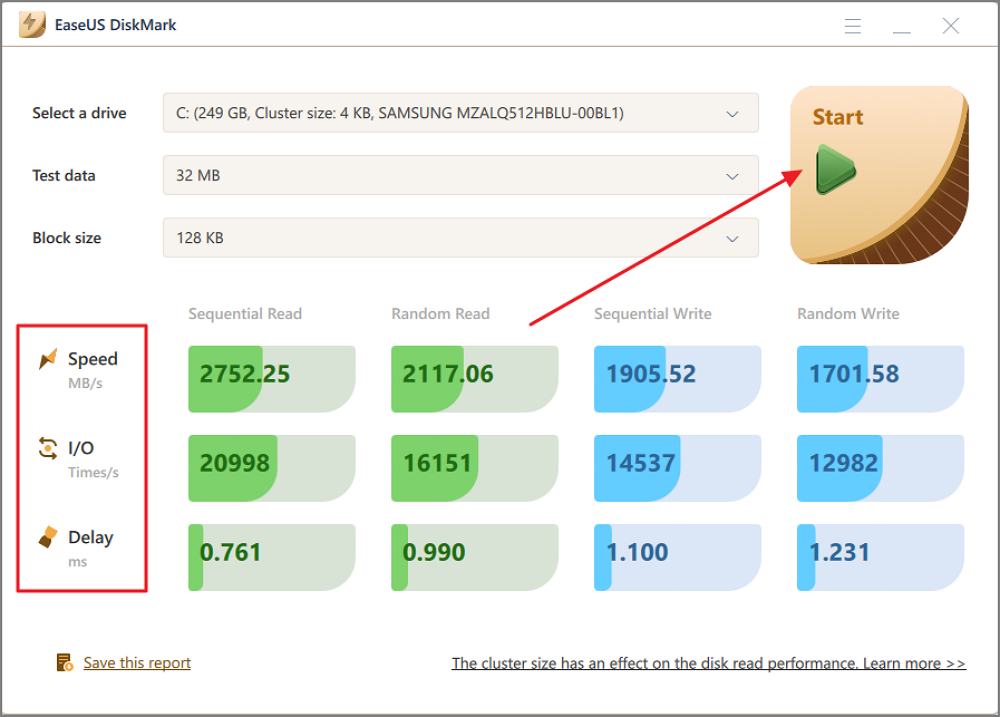Start Your Free Trial!
Sign up to our newsletter, stay updated on news and exclusive offers from EaseUS. Don't worry, if you change your mind, you can unsubscribe at any time, free of charge. We value your privacy (Privacy Policy).
Page Table of Contents
How Do I Check My SSD Speed on My Computer? SSD Speed Test on Widows 10HOT
Guide 1: EaseUS Partition MasterHOT
Guide 2: Run CMDHOT
Guide 3: Run Task ManagerHOT
SSD Speed Test on Windows 10, What Need to Be Aware Of? All You Should Know?HOT
Useful Tips to Optimize SSD Speed on Windows 10HOT
Final VerdictHOT
About the Author
Hot Topics
Updated on Mar 29, 2025
Key Takeaways of SSD Speed Test on Windows 10:

Checking SSD speed could be difficult for beginner users who don't have enough technical knowledge and experience, but we simplified the procedure and listed three easy ways in order to enable you so you can check SSD speed on Windows 10. However, with a little bit of different features, these methods are also applicable to other Windows versions, such as Windows 11, 8.1/8, or even older versions.
Before going to the next step, we want to put some important attributes in front of you about all three methods so you can understand easily which method will be easy and suitable for you.
Here is the comparison of three different methods based on technical skill level, complexity level, and price:
| SSD Speed Test Methods🎯 | Complexity Level🔢 | Price💰 | Target Users👔 |
|---|---|---|---|
| Very easy and quickly performs | $0 | For beginners, suitable for everyone | |
| 2. Run CMD to Test SSD Speed | Medium | $0 | For experienced users |
| 3. Use Task Manager | Medium | $0 | For experienced users |
Now let's move to the next step. We'll go through each method's detailed operational steps to test SSD speed on Windows 10.
This is the very simple and easiest method, especially for beginner Windows 10 users who are not familiar with Windows technology. EaseUS Partition Master can fulfill your demand in no time. With its new DiskMark feature, you can quickly test your SSD drive speed.
So don't wait and download EaseUS Partition Master right now and follow the operational steps to test SSD speed quickly:
Step 1. Launch EaseUS Partition Master. And click the download button to activate the "DiskMark" feature under the "Discovery" section.

Step 2. Click on the drop-down box to choose the target drive, test data, and block size.

Step 3. Once everything is configured, click "Start" to begin the disk test. Then, you can see the Sequential or Random read/write speed, I/O, and Delay data.

This method is 100% free and efficient in testing SSD disk speed. If you think this method is easy and useful, feel free to share this method so as to help more friends who want to test NVMe Speed, monitor SSD, HDD, or external disk speed around you:
This incredible tool EaseUS Partition Master also offers several other features. It completely manages your hard drive partitions, and you'll find other powerful features in EaseUS Partition Master. You can create or delete, resize or move and merge partitions. Also, it allows you to convert to MBR/GPT and NTFS/FAT32.
#SSD Speed Test Software#EaseUS#Free
SSD speed on Windows 10 can be tested easily through Command Prompt. It's important to remember or note down the right and accurate command prompt lines.
Follow the operational steps to test SSD speed with CMD on Windows 10:
Step 1. Search "CMD" in the search box of the taskbar. When it appears, right-click on it and choose "Run as administrator" from the drop-down menu.
Step 2. Type this command: "winsat disk -ran -write -drive (name)".

#SSD Speed Test#CMD#Free
You can also test SSD speed through Task Manager on Windows 10. Good to know that read and write speed is not the actual speed, but several other factors matter regarding SSD speed because data is dynamic.
Here's how you can test SSD speed using Task Manager on Windows 10:
Step 1. Right-click on the "Taskbar" and click "Task Manager" from the appeared menu.
Step 2. In the pop-up window, click "More details" from the bottom left corner.
Step 3. Click "Performance".
Step 4. Click "Disk C" to see the read and write speed of your SSD.

#SSD Speed Monitor#Free
Click the video and learn more information about testing SSD speed:

As we know, SSDs have faster read and write speeds than traditional HDDs. There are many ways to measure the speed of an SSD. You'll be happy knowing that an SSD consumes low power and provides high durability. On the other hand, HDD is the opposite of SSD regarding power consumption, speed, and durability. Our main concern is regarding SSD, what is read and write speed, why we should care about it on SSD, and also what should be the average speed of SSD speed. Here we'll know about that.
The read/write speed of an SSD is the most important factor you should know. Read and write speeds are implicated in different functions on your laptop or computer. Read/write speed directly affects the overall performance of your computer.
Suppose you want to open a heavy file of many gigabytes. Then you'll notice how quickly it's opened in your system. An SSD drive also improves the PC's boot times, and it quickly reads large files on your system.
Suppose you're copying huge files from one drive to another. You'll notice how quickly it transfers data. So, SSD can transfer or copy files and data from one location to another quickly. This is the simplified definition of the read/write speed of an SSD. However, several other factors also matter regarding the SSD drive speed.
The average speed of an SSD depends on the specific model and type.
A few general speed ranges for different kinds of SSDs:
| SSD Type❓ | Read Speed🚀 | Write Speed✈ |
|---|---|---|
| SATA SSD | Around 550 MB/s | Around 520 MB/s |
| NVMe/M.2 SD | Around 3,500 MB/s | Around 3,000 MB/s |
| PCIe/NVMe SSD | Around 7,000 MB/s | Around 6,000 MB/s |
These are just general ranges; specific models and different manufactured SSDs have very different average speeds. The actual speed of an SSD can be determined by different characteristics such as the interface, controller, NAND flash memory, etc.
Once you know the average speed of SSD disks, you can then compare it with your actucal SSD reading and writing speed. Then, you'll know if your disk is slow or not. Also, it doesn't matter when your SSD is indeed slower than its average speed. Follow the tips provided in the next part, you'll know how to optimize the disk speed performance.
So you have learned and checked your SSD speed. Now it's time to learn if your SSD speed is slow and want to optimize SSD speed.
To optimize SSD speed on Windows 10, you can try the following useful tips:
You may also follow the next tutorials for improive SSD performance:
Running an SSD speed test on Windows 10 is easy if you understand and follow the proper methods. For your convenience, we've listed three easy methods and also some useful tips to improve SSD speed if you feel your SSD is running slow. One of the best tools for this task is EaseUS Partition Master, which offers a simple and efficient way to check the SSD speed on Windows 10. EaseUS Partition Master is the best tool to use and ensure accurate and trustworthy results.
Do you have any queries regarding the SSD speed test and optimization, or do you want to learn more? Don't worry. Here are a few frequently asked questions:
1. How do I check my SSD speed on my computer?
There are several ways to check your SSD speed on your computer. One of the easy ways to check SSD speed is through Task Manager. You can open Task Manager, navigate to the "Performance" tab, and click on "Disk C", you'll see the read and write speed of your SSD.
2. How do I know how fast is my SSD?
It's crucial to know how fast your SSD is. You check it through "Command Prompt".
Open "Command Prompt", write this command "winsat disk -ran -write -drive (name)", and your SSD speed will be displayed in the "Command Prompt".
3. Can I run SSD speed test on Mac?
There is no any built-in feature in the Mac that can check SSD speed and show results. For this task, you need reliable third-party apps.
How Can We Help You
Sherly joined EaseUS in 2022 and she has always loved writing articles and enjoys the fun they bring. She receives professional training here, focusing on product performance and other relative knowledge. She has written over 200 articles to help people overcome computing issues.
Written by Tracy King
Tracy became a member of the EaseUS content team in 2013. Being a technical writer for over 10 years, she is enthusiastic about sharing tips to assist readers in resolving complex issues in disk management, file transfer, PC & Mac performance optimization, etc., like an expert.
It won't hot image your drives or align them, but since it's coupled with a partition manager, it allows you do perform many tasks at once, instead of just cloning drives. You can move partitions around, resize them, defragment, and more, along with the other tools you'd expect from a cloning tool.
Read MoreI love that the changes you make with EaseUS Partition Master Free aren't immediately applied to the disks. It makes it way easier to play out what will happen after you've made all the changes. I also think the overall look and feel of EaseUS Partition Master Free makes whatever you're doing with your computer's partitions easy.
Read MorePartition Master Free can Resize, Move, Merge, Migrate, and Copy disks or partitions; convert to local, change label, defragment, check and explore partition; and much more. A premium upgrade adds free tech support and the ability to resize dynamic volumes.
Read MoreIt won't hot image your drives or align them, but since it's coupled with a partition manager, it allows you do perform many tasks at once, instead of just cloning drives. You can move partitions around, resize them, defragment, and more, along with the other tools you'd expect from a cloning tool.
Read MoreI love that the changes you make with EaseUS Partition Master Free aren't immediately applied to the disks. It makes it way easier to play out what will happen after you've made all the changes. I also think the overall look and feel of EaseUS Partition Master Free makes whatever you're doing with your computer's partitions easy.
Read MoreRelated Articles
How to Migrate Windows Server OS to a New Drive (HDD/SSD) [2025 Full Guide]
![]() Tracy King/2025/03/29
Tracy King/2025/03/29
How to Delete OEM Partition in Windows 11/10 [2025 Updated]
![]() Tracy King/2025/01/23
Tracy King/2025/01/23
Solved: Win10 Disk Management Not Loading - 10 Fixes
![]() Sherly/2025/01/23
Sherly/2025/01/23
Bypass Password on HP Laptop Windows 10 [5 Easy Ways]
![]() Oliver/2025/01/23
Oliver/2025/01/23
EaseUS Partition Master

Manage partitions and optimize disks efficiently
Your best companion for disk partitioning, MBR to GPT/GPT to MBR conversion,even OS migration
CHOOSE YOUR REGION
Start Your Free Trial!
Sign up to our newsletter, stay updated on news and exclusive offers from EaseUS. Don't worry, if you change your mind, you can unsubscribe at any time, free of charge. We value your privacy (Privacy Policy).
Start Your Free Trial!
Sign up to our newsletter, stay updated on news and exclusive offers from EaseUS. Don't worry, if you change your mind, you can unsubscribe at any time, free of charge. We value your privacy (Privacy Policy).